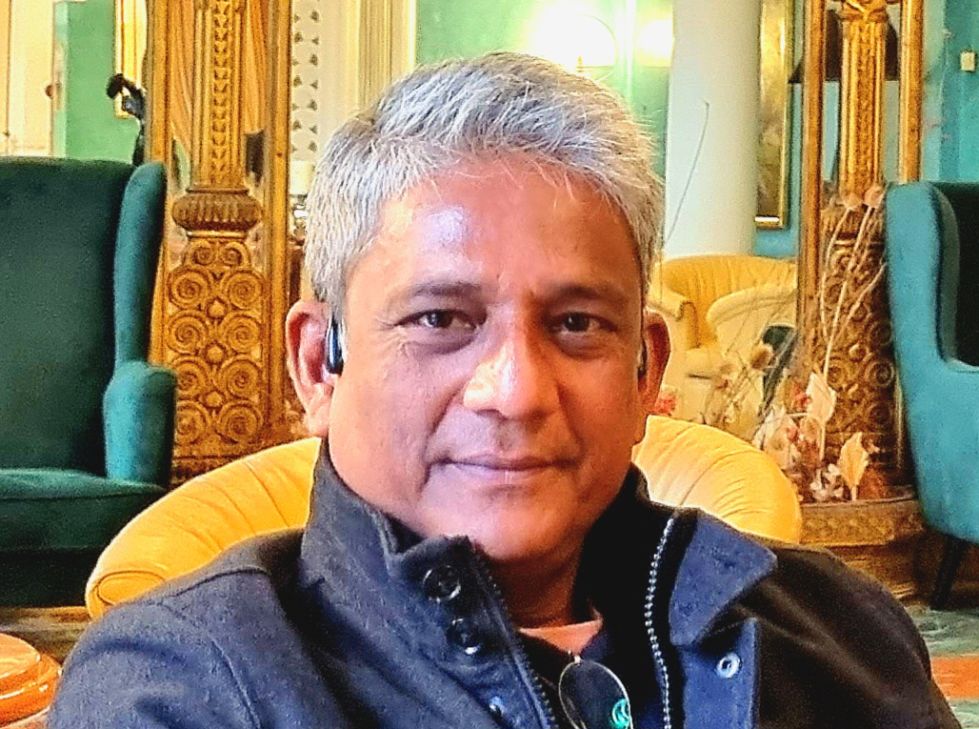This is the second article about the excellent indie film Footprints on the Water, soon to be released in theaters nationwide. The author had the opportunity to Zoom with Nathalia Shyam (lead photo), the director of the film. Nathalia’s base is in London, while Adil Hussain, the lead actor who played Raghu, is based in New Delhi, India.
To summarize, Footprints on the Water is a realistic portrait of immigrants who have idealized and fantastical ideas about a “better life” abroad, ideals that are shattered upon arrival (in the film’s case, to London from India). The story is about the abuse of immigrants, primarily girls and women – from human trafficking, sexual slavery, indentured servitude through work, and other horrors of man inflicted upon those who have been duped.
An underlying theme is how non-Westerners have been brainwashed into or whitewashed into believing the West offers a better way of life, that the West is the be-all and end-all of prosperity, beauty, acceptance, worldliness, and ultimately happiness—things that could never be obtained in third-world (read lesser) nations.
Nathalia comments on her life and how the film partially reflects her experience of coming to London. “ It’s straightforward in that many of the things you see in the film, especially the way the characters lived within the immigrant community, are things that both myself and my sister, who’s a writer, Anita Shyam, had been brought up within the UK. We moved to the UK when I was 10 with my family, and we weren’t sure what to expect.”
“We arrived in a very immigrant-centric part of the UK, which was quite surprising for us because everyone was an immigrant, mostly South Asians, and it felt like an extension of India.
“We found that some of our family friends stayed to themselves and would keep very quiet. We later found out that they were illegal immigrants, and many were part of an undocumented migrant community, who just worked for a pound or two an hour.”
“I had this idea of somebody from this community going missing, such as Raghu’s daughter, Meera. I asked myself what would happen if I couldn’t go to the police or get help.
“I think a lot of it is inspired by what we live through. Also, as filmmakers, this is my and Nitha’s debut feature, and we felt it’s essential to start with something that we really root for and that we know pretty well from the inside.
“So we can be responsible filmmakers and show that this side of the UK does exist, which can spread the word.”
“There were so many emotional peaks and valleys in this film to elicit action, and that’s the same problem as in real life, also globally. It will probably get worse with climate change. We see fluctuations of millions and millions of people. So it is a very relevant topic, I said.
Let’s go to Adil Hussain and the character he played.
“He was so convincing and realistic. His demeanor is not just shyness but his inability to grapple with the fact that his promise to his daughter was based on nothing but fear. A fear of some imaginary pipe dream is what is sold to every immigrant around the world.

What did you do to get into character mode while playing this character?
Adil discussed his background.
“I come from a place in Assam where I was born and lived for 27 years. It’s the northeast part of the country, a little village where the town has a district headquarters. Divided into states are districts, where newspapers used to come three days after publication.
“It’s a very remote place, but at the same time, it was a very close-knit society with a lot of love and cultural activities. I grew up doing theater, dance, and music, and it was also bestowed by nature with everything possible.
“Everyone has a house, a pond at the back of their home, and you don’t have to grow the greens we eat because they just grow at the back of the house because of the rain. To pursue my acting, I came to the capital city where I live now in Delhi, and I was completely a stranger here,
“It was the case in some group of people, you know, the artistic tribe; otherwise, I was completely a stranger, and I found that equally difficult when I went from New Delhi to the UK to study; I get to study, further study acting.
“So, immigration from my town to New Delhi was complicated because of the cultural difference. People were very rough and rude. Generally, the social interactions between people were extremely difficult for me to grasp, and I could not understand why people would say or do such things and the lack of warmth that I grew up with.
“Then, I went from here to the UK, another shock of my life. So, it wasn’t difficult for me to understand Raghu, though the predicaments are very different. The stakes are very high because of the responsibility that the character Raghu has to look after his family, his wife is a child, and the dream to give them a wonderful life, which is an extra imaginary part that I had to add on with the help of the script.
“I also felt that the script was organic and based on the truth of their experience, which gives an actor extra strength to empathize. I didn’t have to do much research because I’m an avid reader and very much in touch with what is happening around the globe.”
Thank you, Nathalia and Adil, for speaking with me today and for waking up at such an ungodly hour.
Keep an eye out for release dates.
